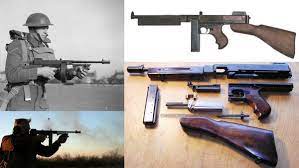
The best way to Legally Carry an NFA Weapon
The National Firearms Act (NFA) was basically launched in 1934 beneath Main professional Franklin D. Roosevelt’s managing as a reply to the growth of brutal criminal offense activities dedicated with firearms. The act was applied with the aim of regulating and manipulating the financial transaction, acquisition, and change of a number of firearms and add-ons regarded too harmful for community use. Throughout the years, The National Firearms Act has been subjected to many amendments and changes to add a wider selection of firearms. On this page, we will dive to the basics of your National Firearms Act, what it really really handles, and how it influences weapon administrators and retailers all over the united states of america.
1. What exactly is the National Firearms Act?
The national firearms act (NFA) is definitely a national guidelines that deals with specific firearms and additional features which may be regarded as too risky or are considered military- and policies-enforcement level. The act was released in 1934 like a legislation aimed at curbing illegal offenses involving using specific firearms. Some of the firearms and accessories managed with the NFA consist of fast-barreled rifles, quick-barreled shotguns, unit weapons, dangerous products, suppressors, and then any other tools (AOWs).
2. NFA Restrictions
Under the NFA, pistol consumers and stores be forced to pay out a income tax and distribute a software on the Bureau of Alcoholic beverages, Cigarettes, Firearms, and Explosives (ATF) before they may acquire, swap or create any one of the aforesaid firearms and accessories licensed through the NFA. NFA taxation are accumulated from the National Firearms Act Stamp (NFA Stamp), which people must connect to the application kind type well before publishing it for that ATF. People also have to go through history document investigations and deliver fingerprints in the application process. With one of these restrictions, the NFA aspires to keep tabs on who possesses firearms and add-ons that current a substantial danger to public security.
3. NFA Exemptions
Its not all firearms and additional items belong to the legislation inside the National Firearms Act. For instance, firearms that are typically employed for putting on purposes, like shotguns, rifles, and handguns, tend not to require an NFA stamp or tax before acquire or swap. Additionally, vintage firearms (made well before 1898) and firearms produced for army use are also exempt in the NFA laws.
4. NFA Effect on Firearm Users and Sellers
The National Firearms Act directly has an impact on tool proprietors and merchants by regulating the purchase, ownership, and move of particular firearms and add-ons considered to be too dangerous for available open public use. Right before obtaining any handgun licensed from your NFA, the person must send a software type (ATF Kind 4), spend a fees, go through fingerprinting, and continue by way of a thorough backdrop look at. Weapon dealers must also experience in depth National Firearms Recognition (FFL) investigations and adhere to all government and express regulations to have qualified for promote NFA-accredited firearms and additional items.
In A Nutshell:
In conclusion, The National Firearms Act is really a government legislation that aims to control and manage the selling, ownership, and transfer of a number of firearms and add-ons deemed too hazardous for open community use. To achieve this, the NFA demands weapon users and retailers to disperse a software kind (ATF Develop 4), pay out a income taxes, experience fingerprinting, and proceed through an extensive history take a look at. While the NFA has faced some critique through the years, it offers shown to be a powerful legislation in curbing the increase of aggressive offences associated with firearms by regulating the purchase, possession, and relocate of firearms and factors that induce a vital threat to public protection.